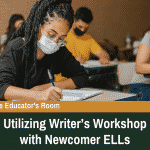 This past semester, as part of a graduate course for a new certification, I did an action research project with some of my second graders. Action research is basically the process of a teacher taking on the role of “researcher” in her or his own classroom with a specific goal in mind. The idea is that teacher can select a problem or area of concern to improve on and go through the research process to find out what is actually going on and how to be a better teacher.
This past semester, as part of a graduate course for a new certification, I did an action research project with some of my second graders. Action research is basically the process of a teacher taking on the role of “researcher” in her or his own classroom with a specific goal in mind. The idea is that teacher can select a problem or area of concern to improve on and go through the research process to find out what is actually going on and how to be a better teacher.
As teachers we tend to follow this pattern without even realizing it: What’s the issue? What do I already know? How might I fix it? What next? But we are often so caught up in the daily craziness that we lose sight of the big questions that we could be asking: Do I really know my kids got it? Why is Sarah or Ahmed shutting down every time we bring up finding ten partners? Ideally action research gives us a method to dig into what’s going on and come out with better answers.
All this is very general so let me be more specific. My second graders this year were pretty strong readers as far as decoding and the “nuts and bolts” of reading went but they struggled with comprehension. This is fairly typical for English Language Learners (ELLs). At the same time the school adopted a curriculum that made a traditional writing workshop almost impossible to fit into the school day. I found this very frustrating as I have often found that writing workshop builds the cognitive skills that support reading comprehension. (I’m not alone in this, by the way.) It seemed natural to explore the link between reading comprehension and writing. My research question became “How can I use writing workshop to support reading comprehension?”
The critical part of that question is “I”. In working through this action research, I made personal discoveries about my own teaching and about my students that I might have never have found if I hadn’t taken such a “deep dive” into my own practice. In this way it was the best professional development I’ve ever done.
To support my action research, I made home visits to most of my students. I created rubrics with my students and recorded out lessons to reflect on later. I took notes on our interactions and thought about the minute-to-minute interactions that make up my lessons. I planned and adjusted as we worked through the unit and conferenced with my students as they read and wrote and talked with each other about what they were working on.
In the end my action research finding were almost secondary to the value of the process of getting to know my students and my own teaching so well. I found that writing workshop supports reading comprehension as long as the teacher supports the students’ writing through organizers, conferencing and co-created rubrics. But I also learned about my students as people and about my own teaching to a level of detail I did not expect.
I would offer the following advice for anyone interested in giving action research a try:
Make your question specific. This is all about your classroom and your kids. It’s called “action research” because the teacher should be able to take action based during the process and based on the results. The answer to your question should make a difference to you.
Incorporate your research into your daily teaching. Again, this process is all about getting practical information about the learning and teaching going on in your room. If you base the whole thing on some cool project you will never do again, it’s not useful.
Video or audio record yourself teaching. Get everyone’s permission, or course. This is a really valuable source of information. Having a concrete record of what happened will allow you to go back and reflect on even the smallest interaction.
Ultimately I found my action research project really empowering. I learned where I needed to improve and where I was already doing a good job. I got to know my students and their families. It was “professional development” in the most meaningful sense of that phrase: it made me a better teacher.





